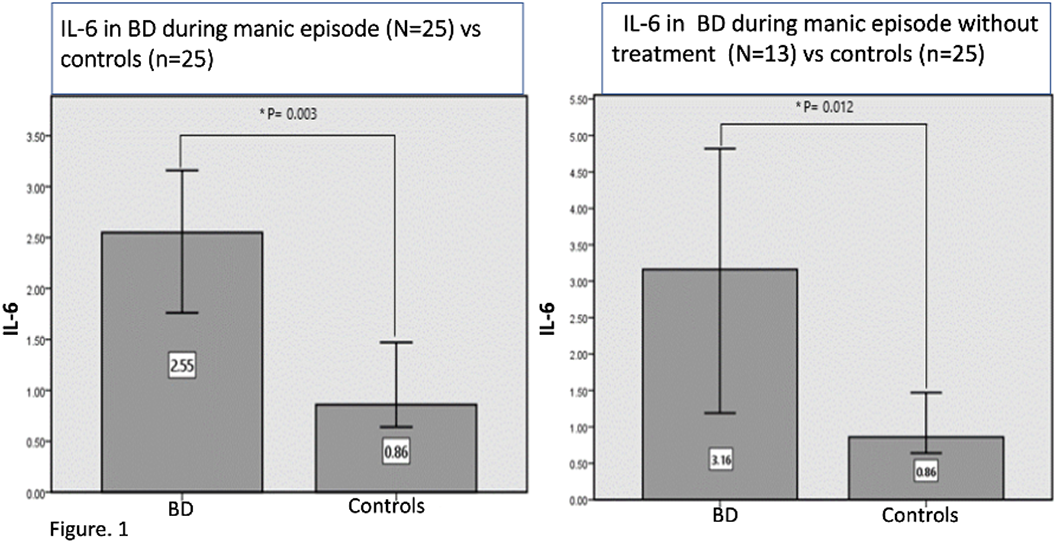Article contents
Inflammatory cytokines during a manic episode in bd patients and its correlation with cognitive and affective symptoms at follow-up
Published online by Cambridge University Press: 13 August 2021
Abstract
Bipolar Disorder (BD) is a severe recurrent disorder with a complex biogenetic and psychosocial etiology. The immune system cytokines in interaction with the CNS play a role in the pathophysiology.
To compare inflammatory cytokines between BD patients and controls during the manic episode; additionally, compare these cytokines with psychiatric symptoms and cognitive performance during follow-up.
We recruited 25 BD patients in mania with paired controls. We measured baseline IL-2, IL-4, IL-8, IL-10, GM-CSG, TNF- α, and TNF- γ in plasma. We used U-Mann-Whitney for group comparison and Spearman correlation between sub-group follow-up assessments and cytokines.
We found a significant difference in IL-6 between subjects and controls (figure 1). During the follow-up, we found a correlation with psychiatric symptoms, cognition, and cytokines during manic episodes (Table 1). Table 1. Follow-up Correlation with cytokines during a manic episode.
| BD follow-up N=8 | Cytokine | MADRS | BPRS | SCIP-S | WMT-SCIP-S | PST-SCIP-S |
| IL-10 | (-) Rho=-.957 (p=<0.001 R2=0.14). | |||||
| IL-4 | (+) Rho=.78 (p=0.02 R2=0.09) | |||||
| INF- γ | (+) Rho=.73 (p=0.03 R2= 0.48) | (+) Rho=.751 (p=0.032 R2=0.53) | (+) Rho=.737 (p=.037 R2=0.40) | |||
| INF- α | (+) Rho=.887 (p=.003 R2=0.53), | (+) Rho=.830 (p=0.011 R2=0.59) |
(+): positive correlation; (-): negative correlation. WMT: working-memory test, PST: Processing-speed test.
IL-6 was significantly different in patients with BD during a manic episode regardless of the treatment they were taking. IL-10 at manic episode was negatively correlated to general psychiatric symptoms, IL-4 positive correlated to depressive symptoms, and cognitive performance was positively correlated to TNF- α and TNF- γ at follow-up.
No significant relationships.
- Type
- Abstract
- Information
- European Psychiatry , Volume 64 , Special Issue S1: Abstracts of the 29th European Congress of Psychiatry , April 2021 , pp. S624 - S625
- Creative Commons
- This is an Open Access article, distributed under the terms of the Creative Commons Attribution licence (http://creativecommons.org/licenses/by/4.0/), which permits unrestricted re-use, distribution, and reproduction in any medium, provided the original work is properly cited.
- Copyright
- © The Author(s), 2021. Published by Cambridge University Press on behalf of the European Psychiatric Association
- 1
- Cited by





Comments
No Comments have been published for this article.